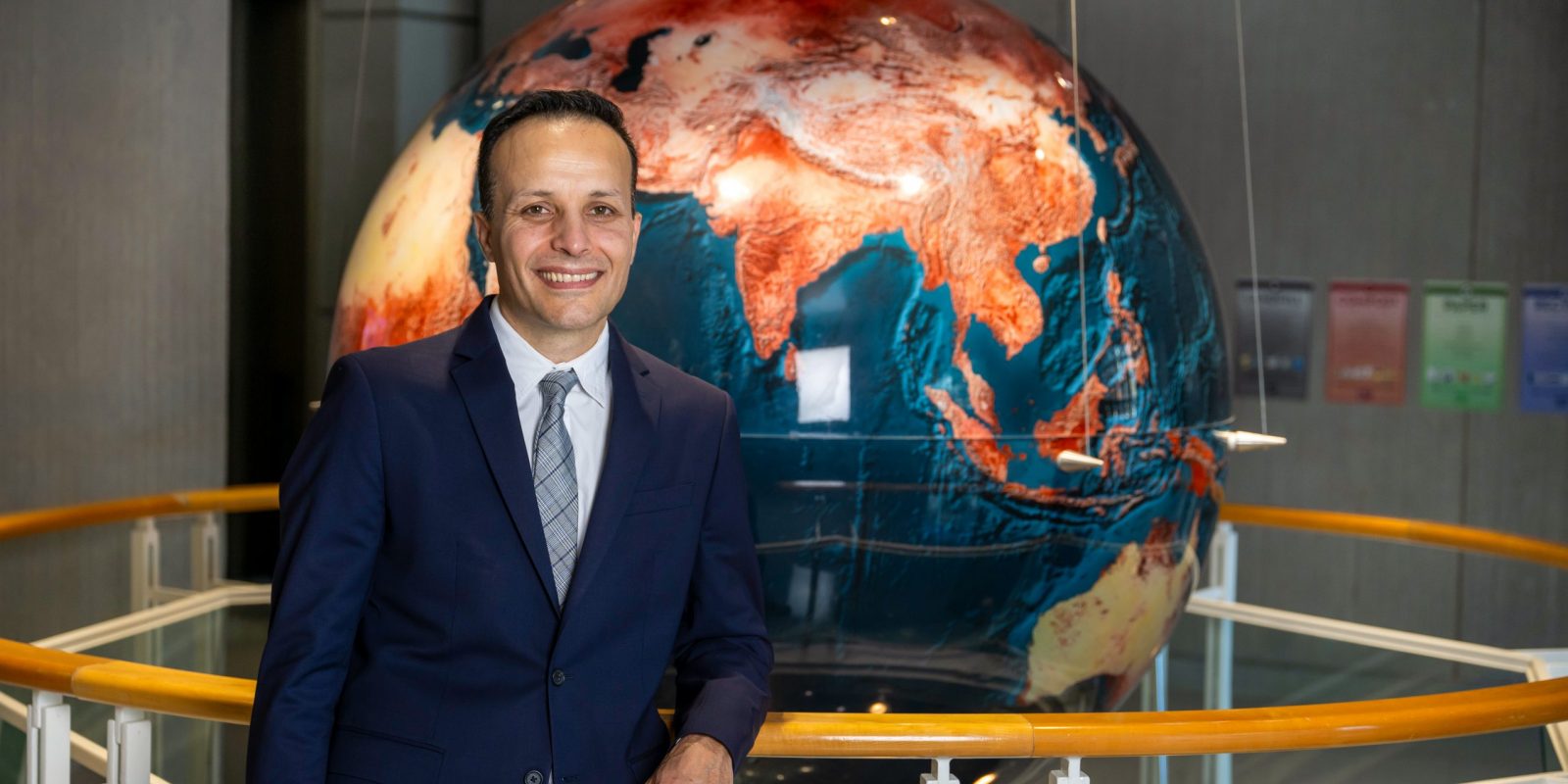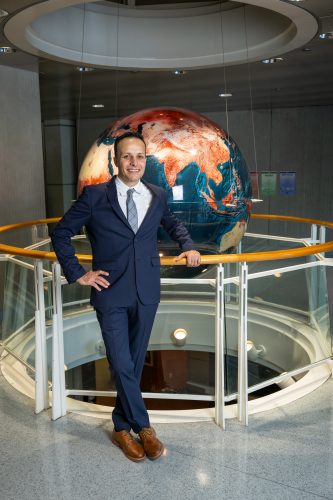
Alonso Sánchez, a senior economist at the World Bank, dedicates his expertise to improving education globally.
Educational Ambassador
Alonso Sánchez helps developing countries make the grade.
In the late ’90s, the son of two professors leaves his community in central Mexico for college — and adventure — in Fort Worth. This math nerd with a penchant for public policy and art history accumulates degrees, including a doctorate from Harvard, before channeling his do-gooder instincts into a career with a specialized agency of the United Nations. Schoolchildren worldwide benefit from his efforts.
The tale isn’t the plot of an inspirational novel but the actual life path for Alonso Sánchez ’01, whose background and expertise inform his leadership as a senior economist at the World Bank. His work focuses on educational projects, predominantly in developing countries. He spent the last four years supporting the education sector in West Africa’s Liberia.
Based in Washington, D.C., the World Bank was founded toward the end of World War II with the goal of funding Europe’s recovery. Eight decades later, its mission has evolved into offering assistance in the form of money and technical expertise, primarily to developing nations. The institution’s goals focus on reducing poverty and fostering economic growth in areas including health care, agriculture and education.
As a senior economist specializing in curriculum instruction and learning, Sánchez works with developing nations in the global south on matters relating to education, everything from teacher training to pandemic-related losses in learning.
“I enjoy helping countries figure out their needs, design projects to address them, reassess and reevaluate based on data and lessons learned,” he said. “There is so much need, but also there is much hope. These projects change lives.”
Learning and Doing
Sánchez grew up in Cholula, in Mexico’s Puebla state, curious about the wider world, something he credits in part to his parents. His mother, Mary Alcocer-Berriozábal, was a sociology professor, while his father, Antonio Sánchez-Aguilar, spent 50 years teaching computer science. During his son’s formative years, Sánchez-Aguilar served as an administrator at Universidad de las Américas Puebla, a highly regarded private university that was TCU’s sister school from 1983 to 2008.
“For as long as I can remember, my son has always been interested in learning more,” Sánchez-Aguilar said. “That’s something he does every day at the World Bank.”
At his dad’s suggestion, Sánchez entered TCU as a math major. His sophomore year, he added art history as a second major.
“It was a very contrasting field to my math, but it made me whole,” Sánchez said. He also met his future wife while studying art. Today, he and Annie Laurie (Eddleman) Sánchez ’01 live in Buenos Aires, Argentina, with their two young children.
“I had known Alonso when he was growing up and watched him as an undergraduate,” said Larry Adams ’66 MA, professor emeritus of sociology and emeritus associate provost for academic affairs. “He was an all-around student who possessed the abilities and qualities to lead a successful life and all of the characteristics we like to see in a TCU graduate.” Sánchez’s involvement in extracurricular activities and his ability to make friends with students from a range of backgrounds impressed Adams almost as much as Sánchez’s academic abilities.
“What makes Alonso special is his heart for other people,” said Ben Wilkinson ’00, a close friend and former TCU classmate. “Whether he was showing TCU students his home in Cholula, Mexico, who were visiting Universidad de las Américas in Puebla as part of a leadership exchange or working together as resident assistants in Milton Daniel Hall, Alonso always expressed a passion for other people.”
Shortly after their son graduated from TCU, Sánchez’s parents moved to Fort Worth to join the TCU faculty at Adams’ encouragement. Sánchez-Aguilar retired in May after a 21-year career on campus. His wife retired from teaching in TCU’s sociology department a decade earlier.

Alonso Sánchez helps countries design and fund initiatives, from teacher training to pandemic learning recovery, as part of the World Bank’s core mission to reduce poverty and foster economic growth globally.
Their son, meanwhile, proceeded to earn two advanced degrees at the University of Texas at Austin: a Master of Public Affairs and a Master of Arts in Latin American studies. For both degrees, his studies centered on public policy, international development, economics and econometrics.
Sánchez went to work as a consultant with the World Bank to focus on economic and policy analysis in the areas of education and labor markets. He loved the international flavor of Washington, D.C., and relished the position, which allowed him to hone his policy and economics expertise while working in Africa, the Middle East, South Asia, Latin America and the Caribbean. He earned a reputation for his strong analytical skills as well as his ability to communicate effectively with people doing the work on the ground.
Craving more knowledge and better tools, he decamped to Cambridge, Massachusetts, where he spent five years at Harvard University pursuing a Doctor of Education degree. His research centered on the economics of education.
“When I left the World Bank, my manager said hurry up and get your doctorate and come back,” Sánchez said. And though he loved being at the forefront of education policy research in academia, he missed “working with teams, providing advice and working side by side to help countries.”
Back to the Bank
Sánchez returned full time to the World Bank in 2015 as an economist focused on global education. He worked to tailor and secure funding for school-based programs in Cameroon, Nigeria, Lebanon, Honduras and Nicaragua.

To the World Bank’s Alonso Sánchez, it’s elementary: Education is vital to developing countries.
“I’ve worked in places where there was active conflict, but I have also worked in countries that are vast like Mexico, my own country,” he said. “The reality is that if you go into the best public schools in major cities there, you think they’re doing all right, but there is a subsystem of schools in rural, Indigenous communities that are just really forgotten.”
The poorest country he has worked in so far has also been the most challenging and, in many ways, the most rewarding.
Sánchez worked alongside the government of Liberia to support a $47 million grant from the World Bank intended to boost secondary education, particularly for adolescent girls. The West African country, which is slightly smaller geographically than the state of New York, has a population of nearly 5.5 million.
“My role [included] supporting the government’s implementation of the project, which had to do with providing technical assistance, ensuring resources were used effectively in a relevant manner and overall support as the need arose,” he said, emphasizing the World Bank’s role as a partner and funder, while governments and local agencies carry out the actual implementation.
So focused was Sánchez on supporting the Liberian mission to improve education that he left his morning office hours open for years to take calls from Liberian teachers, administrators and government officials. This continued until the project wrapped up at the end of June 2025.
“He took time to listen to concerns of other parties involved, understanding their reservations and addressing them with thoughtfulness and respect,” said Binta Beatrice Massaquoi, a World Bank colleague on Sánchez’s team.
“What makes Alonso a great leader is his ability to combine strategic thinking with genuine empathy and commitment to supporting others,” she said. “His leadership style is built on understanding and valuing the perspective of others.”
Safer Schools
Beyond bolstering classroom outcomes, Liberia has gender-related challenges to address in its schools.
“The environment is not the most welcoming for girls, and one of the most tragic things about Liberia is that they still suffer from a lot of gender-based violence,” Sánchez said. “Everything from gender stereotypes to sex-for-grades or abuse from administrators and teachers is leading girls to drop out.”
At the high school level, only 9 percent of the teachers in Liberia are women. Through the World Bank, Sánchez and his co-workers supported the goal of putting one female guidance counselor in every senior secondary school in the country.
“There is so much need, but also there is much hope.”
Alonso Sánchez
The counselors provide academic advice and encouragement to the female student population and serve as a point of contact for reporting abuse allegations.
“What gets me up in the morning,” Sánchez said not long before closing the project, “is the knowledge that I have a seat at the table to work for the children of Liberia, their parents and their communities to better lives through education and safer schools.”
On his frequent trips to West Africa, he could see, feel and hear about the difference the extra support for the female students is making.
“I bring the same sense of adventure I had when I went to TCU to these missions, what the World Bank calls business trips,” he said. “There’s no other way to do this work. You have to go into places, whether it’s a city or a tiny, remote village, and discover how learning is happening and how you can help.
“Yes, you have to have the data, but you have to be able to see it for yourself, too,” said Sánchez, who estimates he spends as much as 20 percent of his time traveling for the World Bank.
In May, he was offered a position with the World Bank in Buenos Aires, where he’ll continue to focus on education projects throughout the region. The family of four made a major life change upon relocating to the Argentine capital at the end of July.
There, as throughout much of the global south, the need to improve educational experiences and outcomes for young learners during this period of economic uncertainty is compounded by the lingering effects of the Covid-19 pandemic still impacting classrooms. But Sánchez can point to measurable victories like those he helped secure in Liberia to maintain his optimism about how change is possible when stakeholders come together with humility and humanity to tackle a singular goal.
“This kind of work, which is very challenging, won’t work if you don’t put yourself in other people’s shoes,” Sánchez said. “You have to understand the politics of the places where we work, but you also have to understand people.”

Your comments are welcome
Comments
Related reading:
Research + Discovery
Cultural Deep Dive
Sonja Watson invites readers to a richer understanding of Latin America’s history and diversity with a new book.
Alumni
Erin Dianis: How It Started … How It’s Going
The Fulbright award winner has found inspiration in teaching overseas.
Alumni
Frog Family Ties
Relatives follow each other to TCU as one generation inspires the next.